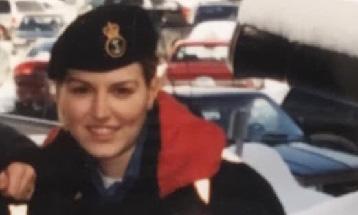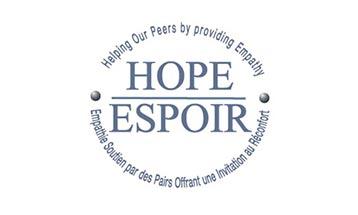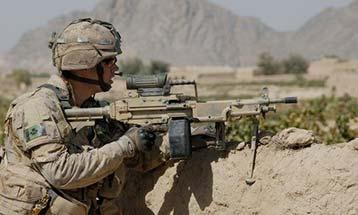Note: This page may contain distressing content. For support, the VAC Assistance Service is available 24/7 at 1-800-268-7708 (TTY: 1-800-567-5803).
Transcription : Retired RCMP Cpl. : Paul Woods
It pretty well started basically from week one.
I was on a main highway between Calgary and Banff. A young teenager and her boyfriend were coming back from Banff, and they somehow ended up on the wrong side of the highway on a four-lane highway. The guardrail broke and ended up trapping the young girl, the 16-year-old, between the guardrail and herself.
When I got transferred back to Ottawa and I was ultimately deployed to Haiti, I realized the impact that Haiti had had on me.
And in returning from Haiti, I realized that there was really no offer or help, and we just went right back to work. And I realized that there's something missing -- there's just too many of us in the hurt locker. So I felt that I just needed to find a way to help.
I was already involved with the Armed Forces program, the OSISS -- the Operational Stress Injury and Social Support program -- and I was trying to bring that into the RCMP.
The force created the support for operational stress injury, which is basically an image of the OSISS program.
I'm a firm believer that if the intervention is soon enough, you'll be a better first responder, you'll be a better police officer, because you'll have the tools to deal with that stress; you'll know what to do. You're not damaged goods. You’re, if anything, I think that somebody who's gone through the therapy and is using the tools will be stronger.
As he began his uniformed RCMP career in 1974 on northern general duty detachment in Alberta, traumatic situations immediately began impacting RCMP Cpl. (Ret) Paul Woods.
“It pretty well started from week one with a call to what was a multiple fatal accident where a car had come head on to a tractor trailer unit. It was an entire family that had passed away, basically run over and crushed under the semi that turned out to be a murder-suicide,” he said.
“As a young recruit, I was alone and needed help from a nearby detachment. So I basically had to deal with that accident by myself (which was normal in RCMP rural policing) for an extended period of time. The reality struck that it’s nowhere near what you see on TV or city policing - you don’t have police cars on every block, you’re lucky if you have a second car in your area.”
While on highway patrol, he vividly remembers a high-velocity car accident that critically injured a 16-year-old girl that still “resonates in my dreams.”
Helping other officers and their families deal with trauma and other impacts of duty became a passion for Cpl. Woods, “I could see many were in the hurt locker and not getting help.” He now works as a Peer Support Volunteer and Mentor in the RCMP Support for Operational Stress Injuries (SOSI) program, the related Veterans program in Ottawa, and with Operational Stress Injuries and Social Support (OSISS).
“I’ve walked the walk, I am not only talking the talk. I’ve lived it and the pain” he explains.
He said it was only much later that he realized that these traumas were leading him to compensate with a lot of extra drinking, which was due to the constant intrusive thoughts, nightmares, hypervigilance and very frustrating loss of memory.
“One day at a peer group meeting, a former RCMP member asked whether others had memory problems and described his experience. And that was when my light came on—that’s exactly how I feel. When we say you’re not alone, it’s also in the small stuff. It’s a normal reaction to an abnormal event that you have lived, not the other way around. For me to seek help, was that I was essentially given an ultimatum by wife and kids.”

Cpl. Woods posts a sign to support newly trained police officers in the early months of the original mission to Haiti UNMIH 1994. The poster is written in Haitian Creole and the bottom reads “serve and protect.”
When initially deployed in Haiti in 1994, Woods was part of a small advance reconnaissance team charged with establishing the UN mission. Within the first couple of weeks he and his team dealt with a mass casualty event where 32 Haitians suffered catastrophic injuries and death.
“We were very alone and there was no emergency equipment, no fire trucks, no tow trucks, no rescue, fuel spilling everywhere, with nothing more than a quickly depleting trauma bag. The four of us had to sort all of the carnage plus concerns over the gathering crowd for the afternoon and well into the evening with no support; we knew we were overdue”, he remembers. As a result of their actions in this incident, he and his team were awarded the Meritorious Service Medal from the Governor General.
Weeks before the end of his mission, he, his partner and a small number of civilians were held hostage. They were surrounded by a large group of individuals, some holding machetes and old rifles. Anything touching his back triggers those memories. When he returned to Canada, he saw the shortcomings in how the RCMP supported those who had experienced trauma, himself included.
“There was no real debriefing even though there was a psychologist available and the member assistance program existed but there was really no offer of help after the mission. We essentially went right back to work. I realized there was something missing,” he said.
“I needed something more intimate where someone who has been there can actually say ‘hey I know what you’re feeling, I know what your nights are like, I know what those intrusive thoughts are like.’ So I wanted to get that training. I needed to find a way to help.”
Before retiring in 2009, Woods got involved in the Canadian Armed Forces OSISS Program because he wanted to bring something similar into the RCMP. Veterans Affairs Canada supports SOSI as it supports the OSI programs.
“My experience with VAC has been great. I’ve received the help and support that I required, I still do.”

Cpl. Woods in his Red Serge following a Peacekeeping memorial parade.
Woods trained as a volunteer with the Member Assistance Program, Critical Incident Management and Critical Incident Debriefing, and later as a peer support volunteer with OSISS and SOSI. He then took on a full-time position within the peacekeeping branch supporting deployed members and their families.
“[Mission have] an impact on everybody I know who was there, to varying degrees. Some just not being able to adjust when they come home, re-integration, to others with full blown PTSD, and everything in between.
“I receive a lot of calls ‘Paul, I’m having these nights, I’m having these dreams, are you?’ And I just felt I needed to help,” he said.
“SOSI offers that little extra, it’s direct support of; ‘listen I know you’re hurting, I can relate to how you feel and we can get you the help you need’ and keep supporting that member throughout the journey”.
Woods’ experience has shown him that frequently by the time members, soldiers or first responders approach a peer program for help, they are usually pretty close to the end of their rope.
“When they ask for help, that’s a huge step because that’s a massive personal admission to have to make. Some just got to that point where they either got an ultimatum at home or are feeling like they’re in the darkest place they’ve ever been, with thoughts of possibly taking their own life – I know that feeling and I can relate to it. Those who are successful and make progress have committed to their therapy. As painful as it may be it’s a necessity.
“You’re not damaged goods, you’re injured. They say that a broken leg that heals is actually stronger at the point of break. I think that somebody who’s gone through the therapy and is using the tools will be stronger.”
He's a firm believer that if the intervention is early enough you can be a better police officer because you will have the tools to manage that stress.
Woods waited 35 years to get the help he needed, he carried the pain of PTSD his entire career. He wishes the help that exists today had been available to him back then.
“There is a beast on my side. It’s now on a leash and when that beast comes out, it lunges, but I’ve got a harness on that beast now - I can pull it back. There is a way out and the sooner you can get that beast on a harness and leash, the better you will be. Don’t wait like I did, 35 years, get it done now,” he says.
“I hate seeing another member or Veteran in that place and I’ll continue doing this as long as I can.”
If you or someone you know is struggling with the transition to life after service, check our website for services related to mental and physical health, finances, education or jobs and housing and home life. We also provide services to families and caregivers who support our Veterans.
The VAC Assistance Service provides free psychological support for Canadian Armed Forces Veterans, former RCMP members, and their families and caregivers. You can reach them 24/7 by phone at 1-800-268-7708 (TTY: 1-800-567-5803 for hearing-impaired persons). You can also make an appointment by online chat Monday to Friday, from 8 a.m. to 7:30 p.m. EST, excluding statutory holidays. Select Veterans Affairs Canada as the organization, password: canada. They can provide you with confidential, immediate, free mental health support. They can also provide a referral to a longer-term mental health professional.



